
Farm and garden weeds are a common problem for many gardeners and farmers. These unwanted plants can quickly take over a plot of land, competing with desirable crops for nutrients, water, and sunlight. Weeds can also be unsightly, reducing the aesthetic value of a garden or field. However, there are a variety of natural and chemical methods for controlling weeds and preventing them from taking over.
Dandelions (Taraxacum officinale) are a common weed in lawns and gardens. These plants are easily recognizable with their yellow flowers and distinctive seed heads. While dandelions may be considered an attractive wildflower, they can be a nuisance in lawns and gardens. One natural treatment for dandelions is to dig them up by hand, making sure to remove the entire root. Chemical treatments, such as herbicides containing glyphosate, can also be effective in controlling dandelions.
Birdweed (Amaranthus retroflexus), also known as knotgrass is a broadleaf annual with tall spikes of green or red flowers. This weed can quickly take over an agricultural field, competing with crops for nutrients and water. Natural control methods for birdweed include regular cultivation and hand weeding. Chemical treatments, such as pre-emergent herbicides, can also be effective in preventing birdweed from germinating.
Chickweed (Stellaria media) is a low-growing annual with small white flowers. This weed is a common problem in vegetable gardens and other disturbed soils. One natural treatment for chickweed is to hand pull the plants, making sure to remove the entire root. Mulching can also be an effective way to prevent chickweed from taking over a garden bed.
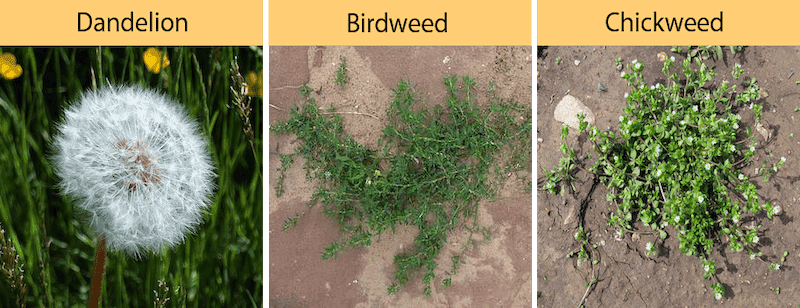
Clover (Trifolium spp.) is a perennial with white or pink flowers. While clover is often considered a desirable plant in pastures, it can be a nuisance in gardens and lawns. One natural treatment for clover is to mow the plants regularly, preventing them from flowering and setting seed. Chemical treatments, such as herbicides containing triclopyr or dicamba, can also be effective in controlling clover.
Pigweed (Amaranthus spp.) is a broadleaf annual with tall spikes of green or red flowers. This weed is a common problem in gardens and agricultural fields. Natural control methods for pigweed include regular cultivation and hand weeding. Chemical treatments, such as post-emergent herbicides, can also be effective in controlling pigweed.
Thistles (Cirsium spp.) are a common weed in pastures and fields. With their spiny leaves and purple or pink flowers, thistles can be difficult to control once they take hold. Natural treatments for thistles include regular cultivation and hand weeding, as well as cutting the plants down before they flower. Chemical treatments, such as herbicides containing picloram or 2,4-D, can also be effective in controlling thistles.
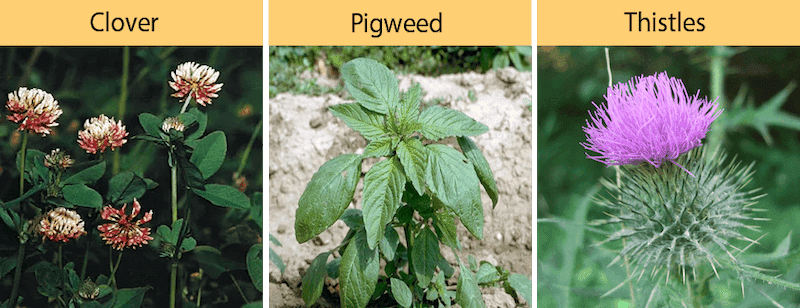
Purslane (Portulaca oleracea) is a low-growing succulent annual with yellow flowers. This weed is a common problem in gardens and disturbed soils. One natural treatment for purslane is to hand pull the plants, making sure to remove the entire root. Mulching can also be an effective way to prevent purslane from taking over a garden bed.
Milkweed (Asclepias spp.) is a common weed in agricultural fields and pastures. While milkweed may be attractive to pollinators, it can be a nuisance to farmers, competing with crops for resources. Natural control methods for milkweed include regular cultivation and hand weeding. Chemical treatments, such as herbicides containing glyphosate, can also be effective in controlling milkweed.
Nettles (Urtica spp.) are a common weed in gardens and along stream banks. With their stinging hairs and serrated leaves, nettles can be a painful nuisance for gardeners and hikers alike. However, nettles can also be a valuable plant, with medicinal properties and as a source of food for certain insects and wildlife. Natural control methods for nettles include hand weeding, wearing gloves and protective clothing when handling the plants, and using a weed trimmer to cut the plants down before they flower. Some gardeners also use vinegar or boiling water to kill the plants, but these methods can also harm desirable plants in the area.
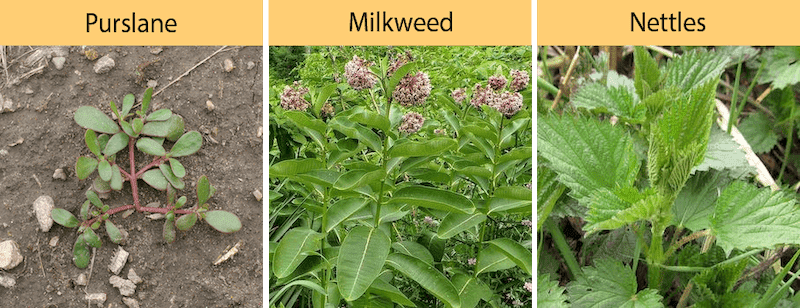
Plantain (Plantago spp.) is a broadleaf perennial with tall spikes of green or brown flowers. This weed is a common problem in lawns and other disturbed soils. Natural control methods for plantain include regular mowing and hand weeding. Chemical treatments, such as herbicides containing 2,4-D or dicamba, can also be effective in controlling plantain.
Wild mustard (Brassica spp.) is a common weed in agricultural fields and pastures. With their yellow flowers and distinctive scent, wild mustard can be a nuisance for farmers, competing with crops for resources. Natural control methods for wild mustard include regular cultivation and hand weeding. Chemical treatments, such as herbicides containing glyphosate or imazapic, can also be effective in controlling wild mustard.
Lambsquarters (Chenopodium album) is a common weed in gardens and agricultural fields. With its small green flowers and serrated leaves, lambsquarters can quickly take over a garden bed. Natural control methods for lambsquarters include regular cultivation and hand weeding. Chemical treatments, such as herbicides containing glyphosate or sulfentrazone, can also be effective in controlling lambsquarters.
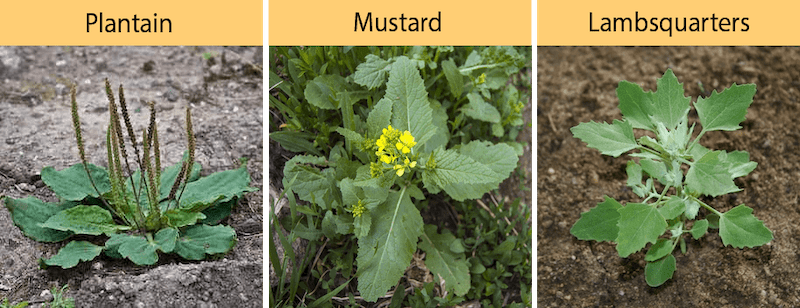
Creeping charlie (Glechoma hederacea) is a low-growing perennial with small purple flowers. This weed is a common problem in lawns and gardens. Natural control methods for creeping charlie include hand weeding and regular mowing. Chemical treatments, such as herbicides containing dicamba or triclopyr, can also be effective in controlling creeping charlie.
Quackgrass (Elymus repens) is a tough perennial grass that spreads quickly in lawns and gardens. Natural control methods for quackgrass include regular cultivation and hand weeding, making sure to remove the entire root. Chemical treatments, such as herbicides containing glyphosate or fluazifop, can also be effective in controlling quackgrass.
Bindweed (Convolvulus arvensis) is a twining perennial with white or pink flowers. This weed is a common problem in gardens and along roadsides. Natural control methods for bindweed include hand weeding and regular cultivation, making sure to remove the entire root. Chemical treatments, such as herbicides containing glyphosate or picloram, can also be effective in controlling bindweed.
Farm and garden weeds can be a frustrating problem for gardeners and farmers, but there are many natural and chemical methods for controlling and preventing their growth. By identifying the specific weeds in your garden or field and using the appropriate treatment method, you can keep your plants healthy and thriving.
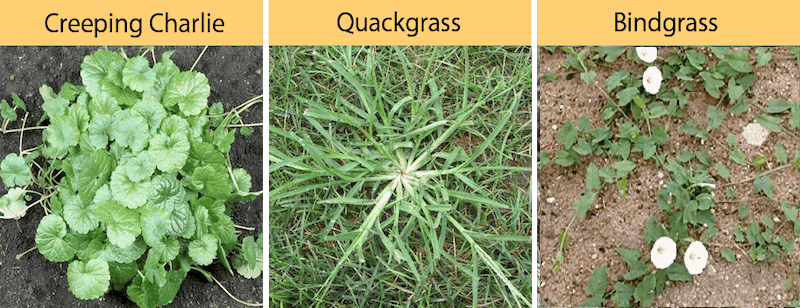
Article Posted Feb 4, 2024